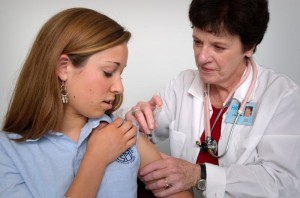HPV vaccine: Conversations between pediatricians and parents key to ensuring daughters get vaccinated
The Centers for Disease Control and Prevention (CDC) says despite there being available protective vaccines against human papillomavirus (HPV) since 2006, they say the HPV vaccine uptake in the US is relatively low.
In 2012, a national survey found that 54% of girls aged 13-17 years had received at least 1 dose of the HPV vaccine series, but only 33% had received all 3 doses in the series. Vaccine uptake is very low among boys.
However, recently published research in the journal, Clinical Pediatrics, says the communication between pediatrician and parent is key to encourage and educate apprehensive parents who delay or refuse the vaccination for their adolescent daughters.
The study by researchers from the University of Massachusetts Medical School and the CDC, “Delay and Refusal of Human Papillomavirus Vaccine for Girls, National Immunization Survey–Teen, 2010”, used data from the 2010 National Immunization Survey for Teens to identify the most common reasons for refusing or delaying the vaccine: concern about its effectiveness or necessity, possible long-term health problems related to the vaccine and the feeling that the teen was not sexually active or did not need the vaccine.
According to the abstract:
We used data reported by parents of 4103 girls, 13 to 17 years old, to assess associations with, and reasons for, delaying or refusing HPV vaccination. Sixty-nine percent of parents neither delayed nor refused vaccination, 11% delayed only, 17% refused only, and 3% both delayed and refused. Eighty-three percent of girls who delayed only, 19% who refused only, and 46% who both delayed and refused went on to initiate the vaccine series or intended to initiate it within the next 12 months. A significantly higher proportion of parents of girls who were non-Hispanic white, lived in households with higher incomes, and had mothers with higher education levels, delayed and/or refused vaccination.
“It’s important to continue to emphasize to pediatricians that they need to have these conversations, and keep having these conversations even if parents delay or refuse the vaccine at first,” said Christina Dorell, MD, MPH, associate medical director in the Office of Clinical Affairs at the Center for Health Policy and Research. “Our research showed that there are different levels of delay or refusal. Eighty percent of people who said they delayed the vaccine before they were interviewed for the survey eventually started or intended to start the vaccine series.”

Young girl getting vaccinated
Image/James Gathany
“Inquiring about parents’ reasons for delay or refusal and seeking opportunities to address concerns or barriers through ongoing discussions may help increase acceptance among parents who delay or refuse vaccinations,” the report concluded.
“Parents are willing to get the HPV vaccine, once they receive a recommendation,” said Dr. Dorell. “The majority of parents are not delaying or refusing. They are willing to have the conversation.”
This study was published about the same time as one by researchers from the Cincinnati Children’s Hospital Medical Center in the journal Pediatrics. This study looked at whether the HPV vaccine leads to either the initiation of sex or unsafe sexual behaviors among teenage girls and young women. According to lead author, Jessica Kahn, MD, based on the findings they concluded that HPV vaccination did not lead to riskier sexual behaviors.
Genital human papillomavirus is the most common sexually transmitted infection (STI). There are more than 40 types of HPV that can infect the genital areas of males and females. These HPV types can also infect the mouth and throat.
HPV can cause serious health problems, including genital warts and certain cancers. There is no certain way to tell who will develop health problems from HPV and who will not. In most cases HPV goes away by itself before it causes any health problems, and most people who become infected with HPV do not even know they have it.
For more infectious disease news and information, visit and “like” the Infectious Disease News Facebook page and the Outbreak News This Week Radio Show page.
Need editorial assistance in preparing journal articles, dissertations, thesis, grant applications, and reports?Check out XCell Editing for available services and prices














